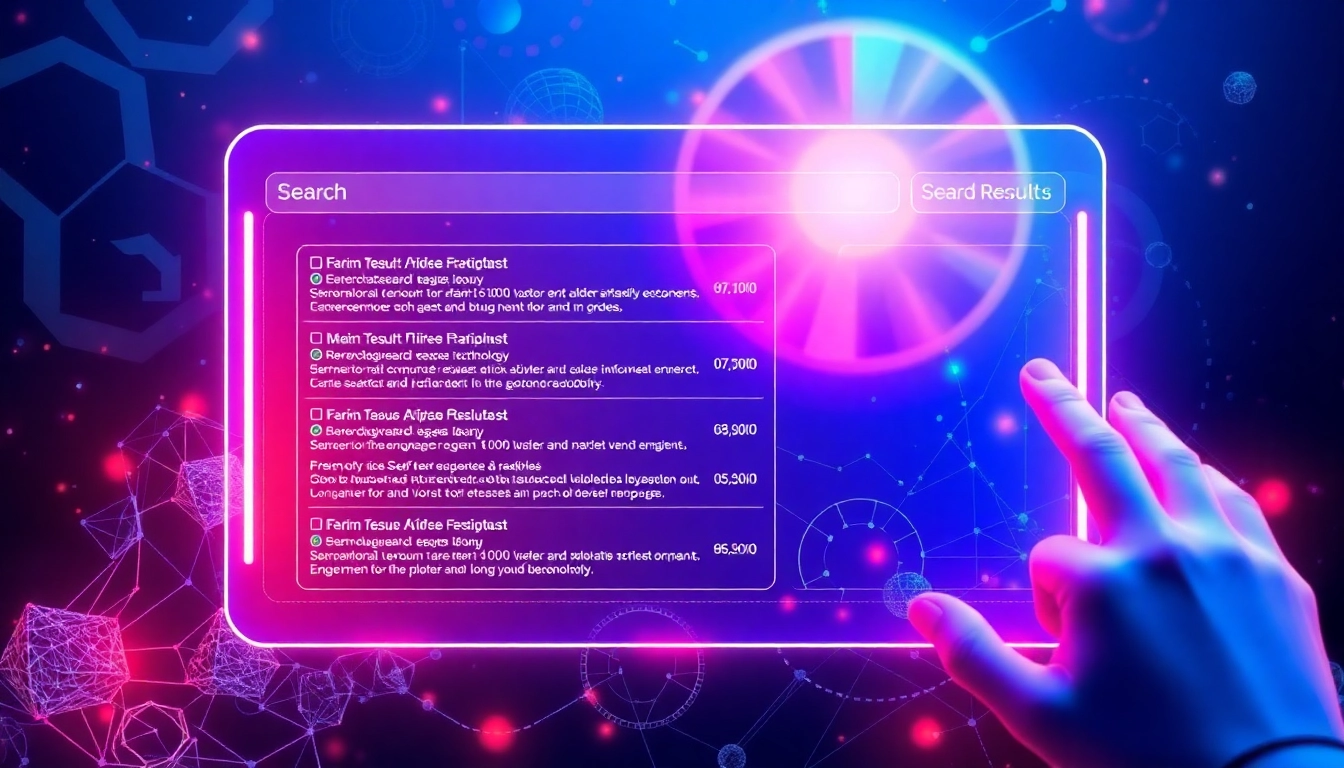Understanding AI Search Engines
What is an AI Search Engine?
AI search engines are advanced information retrieval systems that utilize artificial intelligence (AI) technologies to enhance the search experience. Unlike traditional search engines that rely predominantly on algorithms to index web pages and optimize results based on keyword matches, AI search engines leverage natural language processing (NLP), machine learning, and deep learning techniques to provide more contextual, personalized, and relevant search outcomes. These systems analyze user interactions and content contexts to produce answers that are not only accurate but also comprehensible and useful.
At their core, AI search engines understand semantics and meaning, allowing them to interpret queries in a way that aligns with human thought processes. For instance, when a user inputs a question into an AI search engine, the engine can analyze the intent behind the question and retrieve results that directly answer it, rather than just serving up a list of documents that include the query terms.
How AI Enhances Search Capabilities
AI enhances search capabilities by incorporating various technologies and methodologies, targeting the core elements of search engines: accuracy, relevance, speed, and user engagement. Here are some key enhancements:
- NLP: Natural Language Processing allows AI search engines to comprehend human language in a more sophisticated manner. This means they can handle variations in phrasing, synonyms, and even slang, making user interactions more intuitive.
- Personalization: AI can track user behaviors, preferences, and historical data to tailor search results that are specifically relevant to individual users, enhancing their overall experience.
- Contextual Understanding: By considering the context of a search query—such as location, recent searches, and even the device being used—AI search engines can deliver more appropriate results.
- Real-time Updates: AI search engines can process vast amounts of data in real-time, ensuring that users receive the most current information available.
- Visual and Voice Search: Advanced AI techniques facilitate more engaging modes of searching, including voice commands and visual queries that can interpret images, making searches more dynamic and user-friendly.
Comparing AI Search Engines to Traditional Search Engines
The fundamental differences between AI search engines and traditional search engines can be highlighted in several key areas:
- Query Interpretation: Traditional search engines typically focus on keyword matching and link rank, often resulting in a large number of irrelevant results. In contrast, AI search engines prioritize understanding the user’s intent, which leads to more relevant answers.
- Result Formats: AI search engines may present results in varied formats, including summaries, direct answers, or multi-modal presentations (such as video or audio output). Traditional engines predominantly return lists of links.
- User Interaction: Users often engage with AI search engines through conversational interfaces, enabling dynamic dialogues and follow-up questions, whereas traditional search engines rely on separate queries for each question.
- Learning Capabilities: AI search engines continuously learn and adapt over time based on user interaction data and feedback, enhancing their relevance and accuracy. Traditional engines have limited adaptability in real-time.
Top AI Search Engines of 2025
Leading AI Search Technologies
As we look toward 2025 and beyond, several AI search engines are emerging to dominate the landscape, each bringing unique features and technologies to the table:
- Google Gemini: As Google’s latest iteration in AI search, Gemini combines advanced NLP with Google’s vast data resources, providing unparalleled contextual search results.
- Perplexity AI: This engine combines generative AI with web search capabilities, delivering well-structured answers along with cited sources, making it ideal for research and academic use.
- Bing AI: Microsoft’s integration of AI capabilities in Bing has allowed it to compete closely with Google, providing insights and contextual answers with its Copilot feature.
- You.com: A more privacy-focused alternative, You.com allows users to search by categories and get AI-curated content, blending traditional and AI methods effectively.
- ChatGPT Search: OpenAI’s ChatGPT has now included a web search feature that enhances its conversational abilities, making it a formidable player in information retrieval.
User Experience and Interface Comparison
User experience is critical in the effectiveness of search engines. When comparing AI-based search engines, several elements are important to consider:
- Intuitive Design: The interface design can influence user engagement. Best-in-class AI search engines incorporate user-friendly interfaces that allow for easy navigation and access to additional functionalities.
- Personalization Features: The extent to which each search engine personalizes user interactions significantly impacts effectiveness. Engines that remember user preferences and past queries tend to be favored.
- Modes of Engagement: The capacity for voice search, visual search, and textual search provides options for users. Offering multiple ways to interact with the search engine enhances accessibility.
- Feedback Mechanisms: AI search engines that have built-in feedback loops to gather user impressions can continuously refine and enhance their service.
Case Studies of Effective AI Search Implementations
Real-world implementations of AI search engines provide insights into their efficacy and versatility:
- Google Gemini at a Major News Outlet: A well-known news organization integrated Google Gemini to improve its article recommendations. By analyzing reader behavior, Gemini provided tailored article suggestions based on previous reading pathways, leading to a 20% increase in session duration and user engagement.
- Perplexity AI in Academic Research: A university implemented Perplexity AI to assist students with research queries. The search engine’s ability to synthesize complex information and cite sources led to time savings of over 30%, as students navigated less through irrelevant content.
- Bing AI in E-commerce: An e-commerce platform utilized Bing AI’s capabilities to facilitate better product discovery. By enhancing search results with user reviews and contextual descriptions, the platform saw an increase of 25% in conversion rates due to more informed purchasing decisions.
Optimizing Searches with AI Tools
Best Practices for Effective Queries
To fully harness the power of AI search engines, users should be aware of best practices for crafting effective queries:
- Use Natural Language: Instead of rigid keywords, frame queries in the form of questions or complete sentences to take advantage of the AI’s NLP capabilities.
- Specify Context: Providing context can guide the AI in producing more relevant results. Include details like location, time, and preferences where applicable.
- Leverage Filters: Many AI search engines offer filtering options for narrowing results. Utilize these filters to hone in on desired information quickly.
- Refine Your Search: If the initial results aren’t satisfactory, iteratively refine the query by adjusting phrasing and adding specific terms or questions.
Integrating AI Search Engines into Daily Business Operations
Integrating AI search engines into business workflows can streamline processes and enhance decision-making:
- Knowledge Management: Leverage AI search engines to facilitate easy access to company-wide information and documentation, improving knowledge sharing.
- Customer Support: Use AI search engines within chatbots to provide instant, relevant answers to customer queries, thus enhancing user satisfaction and support efficiency.
- Market Research: Businesses can utilize AI search engines to gather competitive intelligence, track market trends, and research consumer preferences by analyzing search patterns and results.
- Training and Development: AI-powered tools can assist in training employees by providing them with contextual learning materials and knowledge resources on demand.
Future Trends in AI Search Engine Technology
The trajectory of AI search engines promises exciting developments. Key trends to watch include:
- Augmented Reality: Integrating augmented reality with AI search could redefine how users interact with information, creating immersive searching experiences where users can visualize data in real time.
- Enhanced Ethical AI: As the strength of AI grows, so do concerns about data privacy and ethical implications. Future AI search engines may need to prioritize transparency and user consent regarding data usage.
- Hyper-Personalization: With increased capabilities in data analytics, AI search will become even more personalized, potentially predicting what users want before they even ask.
- Collaborative Learning: The future may see AI search engines pooling information across platforms, allowing for collective intelligence that could provide more comprehensive answers across diverse contexts.
Challenges and Limitations of AI Search Engines
Data Privacy and Ethical Considerations
Data privacy remains a paramount concern in the development and operation of AI search engines. Given the amount of personal data these systems collect, it’s essential to establish robust privacy protocols:
- User Consent: Users must be adequately informed about how their data is used, and they should have the option to provide explicit consent before data collection.
- Data Security: Implementing strong security measures to protect user information from breaches is crucial to maintain trust in AI services.
- Ethical Algorithms: Developers must ensure that AI algorithms are designed to be fair and unbiased, preventing discrimination in search results based on socioeconomic factors.
Handling Inaccurate Search Outputs
Inaccuracies can arise from various sources, including outdated information and misunderstandings of user intent. It’s vital for AI search engines to adopt strategies to mitigate these issues:
- Continuous Learning: AI systems should continuously learn from user feedback to improve their accuracy and understanding over time.
- Fact-Checking Mechanisms: Incorporating fact-checking algorithms can help ensure that the information presented is accurate, reliable, and sourced from trustworthy sites.
- User Feedback Mechanism: Enabling users to report inaccuracies can aid in improving the search engine’s quality control and overall effectiveness.
Future Development Needs in AI Search
As AI search engines evolve, they will require ongoing development to address emerging challenges and stay ahead in an increasingly competitive landscape:
- Research and Development Investments: Continuous investment in R&D is essential to innovate and improve AI technologies, keeping pace with advancements in machine learning and NLP.
- Adaptation to User Behavior: AI search engines must adapt quickly to changing user behaviors and preferences to remain relevant and effective.
- Cross-Platform Integrations: Developing APIs and integrating AI search capabilities across various platforms will enhance usability and broaden their applications.
Getting Started with AI Search Engines
Choosing the Right AI Search Engine for Your Needs
Selecting the right AI search engine involves assessing several criteria to find the best fit:
- Functionality Requirements: Determine what features are critical for your business or personal usage. Consider needs like language support, query types, and integration with other tools.
- Usability: Evaluate how user-friendly the interface is. Ideally, the system should have a low learning curve, allowing users to gain proficiency quickly.
- Performance Metrics: Research the performance levels of various engines. Look for case studies or user testimonials that highlight effectiveness, accuracy, and speed.
- Support and Community: A thriving community and adequate customer support can significantly affect your experience with an AI search engine.
Setting Up and Configuring an AI Search Engine
Setting up an AI search engine can range from straightforward to complex, depending on the platform and usage needs. Here are general steps for successful implementation:
- Identify your primary objectives and requirements before entering the setup process. Understand what you want the AI search engine to achieve.
- Select the AI search engine that aligns with your needs and create an account or sign up for the service.
- Follow the configuration instructions provided by the service. This might include setting preferences, data sources, and personalization options.
- Run initial tests while adjusting settings to improve relevance and accuracy, ensuring the system meets your expectations.
- Train your team on how to utilize the features effectively, emphasizing the importance of best practices for query formulation.
Training Users to Maximize AI Search Results
To ensure users can leverage the full potential of AI search engines, organizations should invest in proper training:
- Workshops and Training Sessions: Host sessions dedicated to demonstrating how to use features effectively. Focus on crafting queries and understanding the AI’s capabilities.
- Creating Documentation: Provide easy-to-use guides, FAQs, and troubleshooting resources that users can refer to when needed.
- Encourage Feedback: Create a culture of feedback regarding the search experience, enabling continuous improvement of user training resources and AI performance.
- Promote Best Practices: Disseminate best practices for searching, emphasizing natural language queries and contextualization to enhance usability.







Leave a Reply